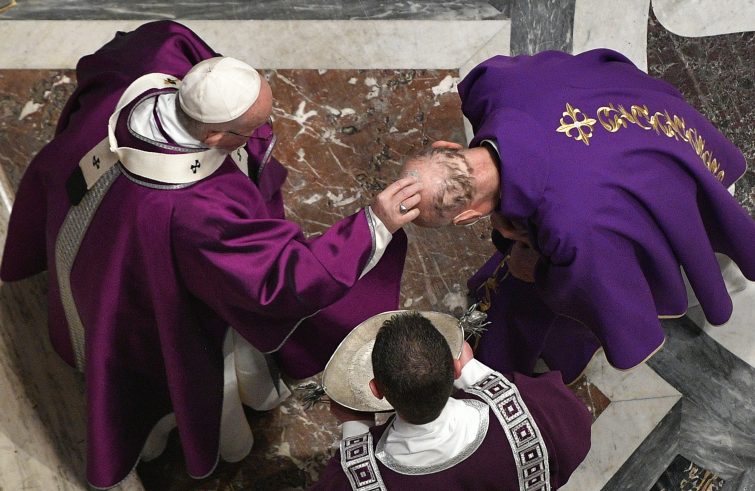
“Lent is not just not about the little sacrifices we make, but about discerning where our hearts are directed. This is the core of Lent,” Pope Francis said in his homily at Mass for Ash Wednesday, with the blessing and imposition of ashes in St. Peter’s Basilica, the first day of Lent leading up to Easter Sunday. “Let us ask: Where is my life’s navigation system taking me – towards God or towards myself? Do I live to please the Lord, or to be noticed, praised, put at the head of line…? Do I have a “wobbly” heart, which takes a step forwards and then one backwards? Do I love the Lord a bit and the world a bit, or is my heart steadfast in God? Am I content with my hypocrisies, or do I work to free my heart from the duplicity and falsehood that tie it down?”, Francis said. “How many times, in our activity or indifference, have we told him: ‘Lord, I will come to you later, just wait a little… I can’t come today, but tomorrow I will begin to pray and do something for others’. We do this, time and time again.” “In this life, we will always have things to do and excuses to offer, but right now is the time to return to God”, the appeal: “Return to me, He says, with all your heart. Lent is a journey that involves our whole life, our entire being. It is a time to reconsider the path we are taking, to find the route that leads us home and to rediscover our profound relationship with God, on whom everything depends.”
“All of us have spiritual infirmities that we cannot heal on our own. All of us have deep-seated vices that we cannot uproot alone. All of us have paralyzing fears that we cannot overcome alone”,
the Pope said, exhorting us to imitate the leper, and reminding us that the journary of Lent is an exodus, an exodus from slavery to freedom. As it was for the people of Israel, for us too it is hard to leave Egypt: “Our journey back to God is blocked by our unhealthy attachments, held back by the seductive snares of our sins, by the false security of money and appearances, by the paralysis of our discontents.” “To embark on this journey, we have to unmask these illusions”, Francis’ guidance: “We can think of the prodigal son and realize that, for us too, it is time to return to the Father. It is the Father’s forgiveness that always set us back on our feet. God’s forgiveness – Confession – is the first step on our return journey.”
“I ask confessors to be like fathers, offering not a rod but an embrace”,
is the Pope’s unscripted recommendation.
“We should no longer live our lives chasing dust, chasing things that are here today and gone tomorrow”,
said the Pope: “Let us return to the Spirit, the Giver of Life; let us return to the Fire that resurrects our ashes, to the Fire who teaches us to love. Let us pray once more to the Holy Spirit and rediscover the fire of praise, which consumes the ashes of lamentation and resignation.” “Our return journey to God is possible only because He first journeyed to us”, Francis remarked: “Otherwise, it would be impossible. Before we ever came to Him, He came down to us. He preceded us; he came down to meet us. For our sake, He lowered himself more than we can ever imagine: He became sin, He became death.”
“No one can be reconciled to God on his or her own”, Francis assured: “Grace saves us; salvation is pure grace.” “Do I feel in need, or do I feel self-sufficient?”, the Pope asked.
The rite for the blessing and distribution of ashes, Lent, teach us that
“salvation is not an ascent to glory, but a descent in love. It is about becoming little.”
“Lest we go astray on our journey, let us stand before the cross of Jesus”, is the set direction: “It’s the silent throne of God.
Let us daily contemplate his wounds.
In them, we recognize our emptiness, our shortcomings, the wounds of our sin and all the hurt we have experienced. Yet there too, we see clearly that God points His finger at no one, but rather opens his arms to embrace us. His wounds were inflicted for our sake, and by those wounds we have been healed. By kissing those wounds, we will come to realize that
in life’s most painful wounds, God awaits us with his infinite mercy.
Because there, where we are most vulnerable, where we feel the most shame, He came to meet us. And having come to meet us, He now invites us to return to Him, to rediscover the joy of being loved.”










